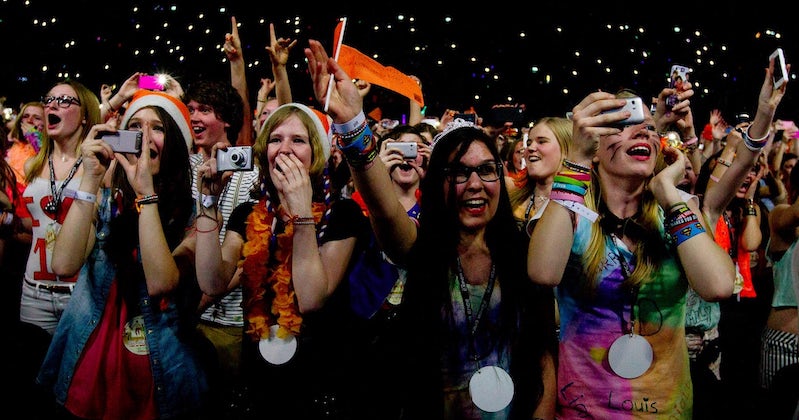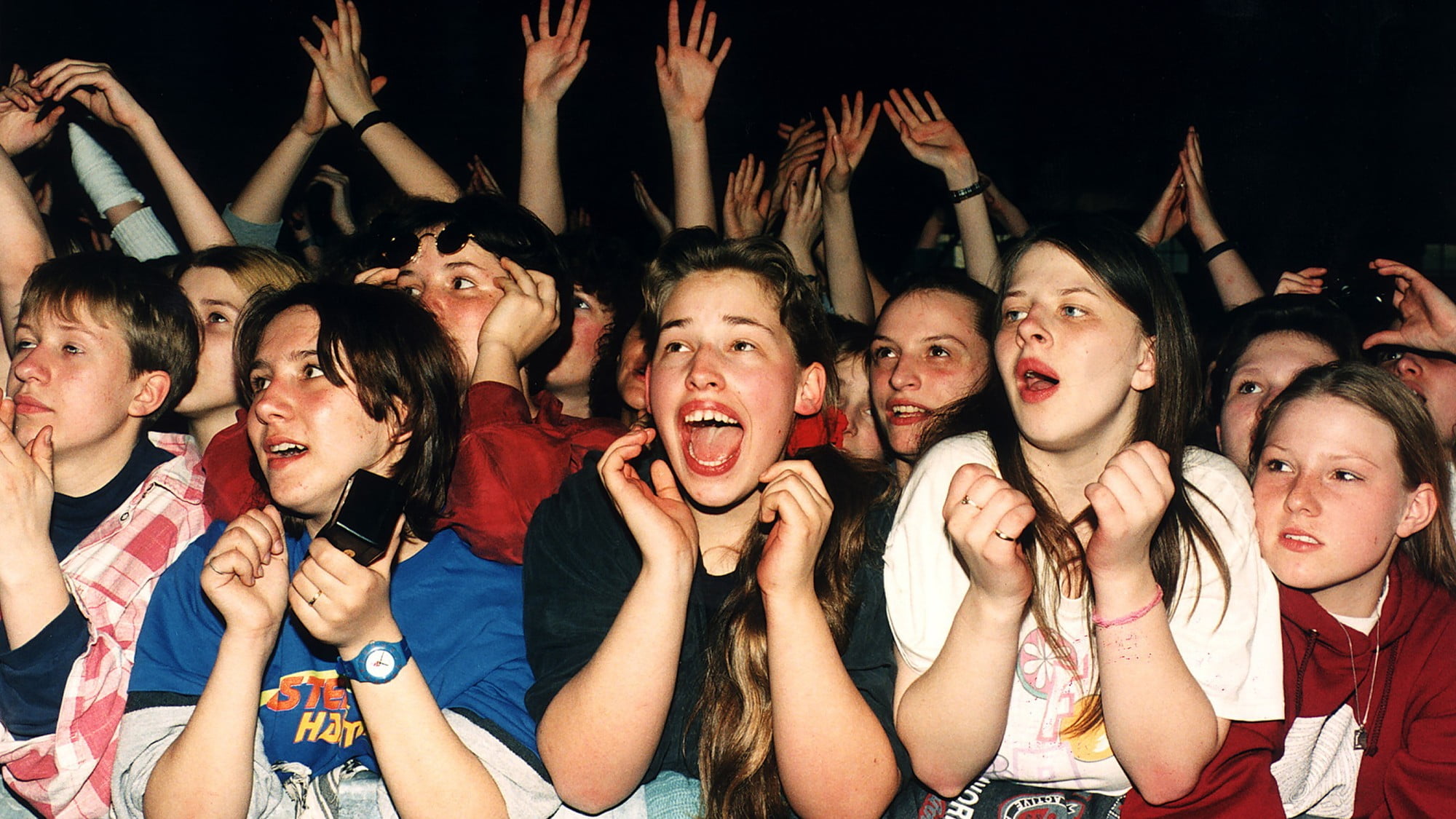When the South Korean boy band BTS attended the Sustainable Development Goals Moment at the 76th United Nations General Assembly this year, it was followed by TV host James Corden remarking, “It actually marks the first time that 15-year-old girls everywhere found themselves wishing that they were Secretary General António Guterres.”
After receiving backlash, he later deleted the video. However, it is unfortunately reflective of a larger problem of the trivialisation of female-dominated interests and the emotions surrounding them.
Gender stereotypes and fans
As cited in an article on female fans in Vocal Girls, “The 1960s saw the rise of Beatlemania – excitement expressed by young female fans of The Beatles. Beatlemania courted the idea of ‘hysterical females‘ by implying that these fans were nothing more than delirious, screaming kids. Some journalists at the time even described the phenomenon as a “mental disturbance” or “Liverpool lunacy” that “drives the immature, shall we say, ape”.
The language choice very indiscreetly suggested that these women were not of sound mind, and sent the message that female music fans were not to be taken seriously. The reality, however, was that these young women were able to launch the career of the legendary band that ‘real music fans’ (i.e. men) now wish to gatekeep.
A recent victim of the ‘hysterical female’ trope has been the rise of the ‘fangirl’. Reminiscent of peak 2014 internet culture, perhaps, the term describes young women with a dedicated interest in something. It isn’t a compliment, though; a quick Google search of the phrase ‘are fangirls’ produces the autofill suggestions ‘annoying’, ‘the worst’, and ‘cancer’. It has become an insult – levied against women who are ‘too loud‘, or ‘too passionate‘ in their interests”.
In their time, The Beatles might have been underplayed by men but today, it is them that often use the same band to underplay currently active boybands.
However, football fans or sports fans in general, largely consisting of men are rarely criticised the same way female-majority fandoms often are. Female fans for forms like pop music can hardly hold a candle to this and their reactions are only labelled as hysterical and obsessive, ramblings that must be reversed with age

Not only is this trend sexist and ageist but also shows how the emotions of women are often dismissed and trivialised. In the Euro Cup 2021 finals that concluded few months ago, England lost to Italy. What followed was English football fans violently attacking their Italian counterparts with racially charged abuse online as well as offline including vandalisation on streets. Even at the beginning of the match, ticketless spectators, due to the lack of proper systems in place had broken COVID protocols, stormed barriers, and swamped into the stadium.
However, football fans or sports fans in general, largely consisting of men are rarely criticised the same way female-majority fandoms often are. Female fans for forms like pop music can hardly hold a candle to this and their reactions are only labelled as hysterical and obsessive, ramblings that must be reversed with age.
Dedicated music fans are undoubtedly advantageous to artists. Given that the general public opinion can shift anytime, it is fans who dedicatedly and consistently follow content. Being in a fandom has numerous advantages too. Besides the obvious feeling of community and belonging, one can learn skills such as blogging, video editing, organising fundraisers etc. If a sports fan can be considered to be gaining useful skills such as analytical insights inside the game, why cannot a female music fan gain something equally “useful”?

When a woman likes a certain music artist, it is almost always seen with the conviction that it must be the attractive looks of the artist rather than the compositional or productional value of the music. If a woman likes a genre or an artist with a largely male-dominated fandom, they are almost always questioned on their knowledge of the artists and their songs.
Also read: Be Melodramatic: A Korean Drama About Women With Pursuits Other Than Men
This is not just limited to music but several other fields of interest like movies, anime etc. For example, male anime fans are often skeptical of their female counterparts, questioning whether they can completely appreciate the form or are in it just for jumping on the bandwagon. Watching romance anime, typically assumed to be watched by women, is trivialised as compared to other genres like thrillers and the like. Rather than being regarded a personal choice, it is often a gendered stereotype. This in turn, reinforces the impression that female-dominated interests are superficial and lack intellectual thought and concern.
It is time we stop dismissing female fans
Dedicated music fans are undoubtedly advantageous to artists. Given that the general public opinion can shift anytime, it is fans who dedicatedly and consistently follow content. Being in a fandom has numerous advantages too. Besides the obvious feeling of community and belonging, one can learn skills such as blogging, video editing, organising fundraisers etc. If a sports fan can be considered to be gaining useful skills such as analytical insights inside the game, why cannot a female music fan gain something equally “useful”?
Even if they do not, why can one not simply pursue what interests them and gives them joy, without the constant pressure of having to obtain something from it?

The very fandom that James Corden dismissively commented on comprises of 15-year-old girls seemingly uninterested in world affairs, have previously showcased immense mobilisational skills during the Black Lives Matter movement in 2020. They raised one million dollars to match BTS’ contribution in just over 24 hours.
Recently, the Indian fanbase raised 2 million Rupees for COVID-19 relief in India in under 24 hours. This is only the tip of the iceberg when it comes to the work that arguably the largest fandom in the world has been doing, and they are not the only ones.
It would be ignorant to not take into consideration the often dangerous lengths some fans might tend to go to, but the brunt of this can hardly be dumped onto female fans. Like an article on Shit You Should Care About mentions, “But teenage girls, their tastes, and their market power now occupy a bizarre place in popular culture. They are still reviled; saying that something was made for teenage girls is still an easy way to disparage a piece of music or a film or a book. Simultaneously, they are revered and dreaded as arbiters of all that is cool. And amid all this reviling and revering, they are fetishised as the ultimate audience for advertisers. Teenage girls form a market share worth its weight in gold.”
Therefore, perhaps it is time to stop drawing the hypocritical boundary between female dominated fandoms and male-dominated ones and to stop dismissing the emotions of women as trivial with respect to popular culture.
Also read: How K-Pop Perpetuates Double Standards For Men And Women
Sudarshana Ganguly is currently pursuing a Bachelors in English from Jadavpur University. When she’s not procrastinating or falling victim to impulse retail therapy, she can be found learning new languages, fangirling over her favourite kpop acts and daydreaming about herself as a future magazine editor. You may find her on Instagram
Featured Image Source: Garage
About the author(s)
Sudarshana Ganguly is currently pursuing a Bachelors in English from Jadavpur University. When she’s not procrastinating or falling victim to impulse retail therapy, she can be found learning new languages, fangirling over her favourite kpop acts and daydreaming about herself as a future magazine editor. She is passionate about fashion, especially about how it can be made more sustainable and inclusive.






